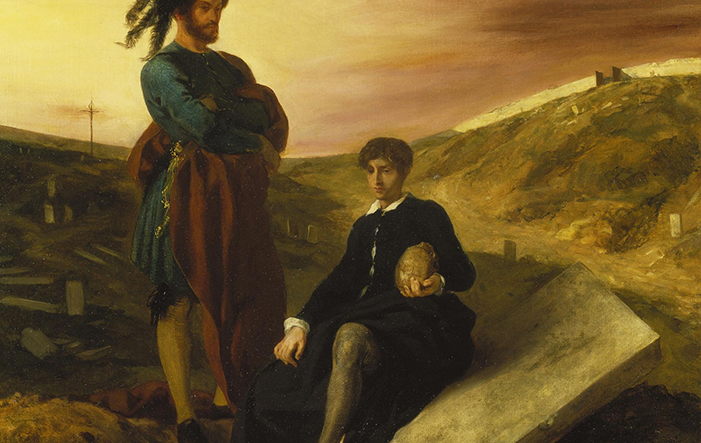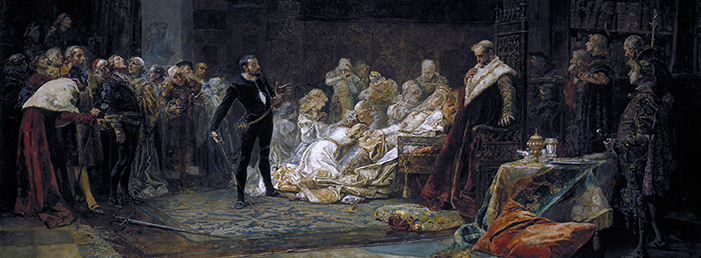Blogging Hamlet: Part 12

Well, guys, we’ve been through a lot together. Remember when Hamlet accidentally stabbed Polonius? Remember when Hamlet spent five whole minutes setting up the world’s most convoluted poop joke? Remember when Ophelia returned to the sea? What I’m saying is this has been a ride, and if you’ve stuck it out this long with me, you deserve a gold star for your efforts.
If you don’t remember what happened last time, well, then I’m disappointed in you and you can go wait in the car, because last time was the best thing that’s happened, full stop. It was Ophelia’s funeral, and it ended with both Hamlet and Laertes jumping into her grave and wrestling with each other. I tried to find this scene in art, since this post is the last time I’ll be able to sift through the Hamlet section of Wikimedia Commons, but all I could find were various paintings of Hamlet clutching a skull that could just as easily be a coconut:

Wikimedia Commons
So! Here we are, in Act 5, Scene 2. Hamlet has left the funeral, and he’s telling Horatio how he came to be here in Denmark. Last everyone heard, Hamlet was lighting out for England. However, mid-journey, Hamlet got curious, and he went through Rosencrantz and Guildenstern’s things. There he found a letter from Claudius to the king of England requesting that Hamlet be killed.
Since the letter was sealed and Claudius didn’t tell Rosencrantz and Guildenstern what he was planning, I think it’s safe to say neither of them knew what they’d agreed to. (I say this within the context of Hamlet, and not the Tom Stoppard play, WHICH I HAVE NOW READ THANKS TO YOU GUYS.) Still, it’s been a while since we had a good murder, so Hamlet was like, “I can’t believe they unknowingly accompanied me on what turned out to be an assassination plot by Claudius! I hope they ENJOY DEATH.”
In true Hamlet fashion, he rewrote the letter to say the king should murder Rosencrantz and Guildenstern without asking questions. He then sealed it with his father’s signet ring which he apparently keeps in his pocket for occasions like these.
He waits for Horatio to be impressed by this, but Horatio just kind of goes, “So you murdered our friends.” Hamlet responds by basically saying, “Well, they should have thought about that before they were so expendable.”
He says now he kind of HAS to kill Claudius, if you think about it. God would probably be mad at him if he DIDN’T.
They suddenly notice some random guy standing there. His name is Osiric. Welcome to the play, Osiric. Hamlet whispers to Horatio that this guy’s a ridiculous social climber who will do anything to get in good with the right people, which Hamlet demonstrates by forcing him to take his hat off and put it back on again a few times before we can really get down to business. Osiric tells Hamlet that Laertes has challenged Hamlet to a duel, and that Claudius has bet a great deal on Hamlet to win.
Now, if you’re anything like me, you hear “duel” and you think, “Man, that could mean anything!” It could mean:
- A duel of swords
- A duel of matched pistols
- A children’s card game
Obviously in each of these scenarios, someone has to die. However, what Laertes has proposed is just some playful fencing. As far as Hamlet knows, no one is going to die. He says he’s in. He DOES mention to Horatio that he has a bad feeling about this, possibly because he’s dueling the guy whose father he recently murdered and the whole thing was organized by the uncle who tried to have him killed, but then he’s like, “Eh, whatever happens happens.”
Claudius, Gertrude, Laertes, and a bunch of lords and other attendants arrive for the duel, which apparently has to happen right now. Hamlet is uncharacteristically contrite all of a sudden. He apologizes to Laertes for beating him up at his sister’s funeral and also for killing his father. He says his madness was to blame. Laertes accepts this non-apology, but says he still has to duel Hamlet for honor or whatever. They both prepare to duel.
Remember: Laertes’ blade has been dipped in poison. Also, Claudius has a poisoned cup of wine at the ready for Hamlet just in case the blade doesn’t do the trick. There’s absolutely no way this could end badly.
Indeed, barely two pages of friendly swordplay later, Gertrude, who doesn’t know about Claudius and Laertes’ plot, decides to drink to Hamlet’s health. She takes a big swig of the poisoned wine, and Claudius, who can think of no way he might have prevented that from happening, says to himself, “It is the poisoned cup. It is too late.”
Laertes notices this and realizes things are about to kick off. He says in an aside to Claudius, “I’m going in for the kill.” He has a moment of clarity and he hesitates, but then he goes ahead and stabs Hamlet anyway. Hamlet lunges, they scuffle, and somewhere in the confusion they wind up switching blades. Hamlet wounds Laertes with the poisoned sword.
And then, just like that, EVERYONE STARTS DYING ALL AT ONCE.
Gertrude collapses. Then Laertes collapses. Claudius tries to say that Gertrude fainted at the sight of blood, but Gertrude is able to warn Hamlet about the poisoned drink before she dies. Hamlet, realizing all is not what it seems, tells the inexplicable Osiric to lock the doors. In his final moments, Laertes has a change of heart; he warns Hamlet that this whole thing was Claudius’s doing, that the sword was poisoned, and that he and Hamlet are both dying. He also begs Hamlet for his forgiveness.
Well, Hamlet doesn’t get around to forgiving Laertes before Laertes dies, but he does manage to stab Claudius and then force him to drink the poison. Claudius dies immediately. Hamlet remembers Laertes and says, “Oh, right. You and me? Yeah, we’re cool,” at his already-dead body, so at least there’s that.
Hamlet collapses. He looks to Horatio and says, “HORATIO, I’M DYING. TELL MY STORY.” Presumably, Horatio replies, “I DON’T EVEN KNOW WHAT JUST HAPPENED. THIS WHOLE SEQUENCE OF EVENTS WAS EXTREMELY CONFUSING.” If you feel the same, worry not. Here is an artist’s depiction of what went down. You’ll notice Claudius looks offended, because that’s how people look when they’ve been stabbed. They look offended.

Wikimedia Commons
Cue the sound of trumpets! It’s the arrival of Fortinbras’s army. He just defeated Poland, and now he’s coming for Denmark, which I’m guessing was his plan all along. Hamlet’s final act is to tell Horatio that Fortinbras has his vote for king, probably because everyone else is dead but also because he really identifies with Fortinbras, the fatherless son who wants revenge and is actually poised to get it. Hamlet dies (“The rest is silence”), and Horatio mourns:
Now cracks a noble heart.—Good night, sweet prince,
And flights of angels sing thee to thy rest!
Fortinbras himself enters the scene and calls upon Horatio to explain this corpse party he just rolled up on. Horatio gives him a quick synopsis —“So shall you hear/Of carnal, bloody, and unnatural acts,/Of accidental judgments, casual slaughters,/Of deaths put on by cunning and forced cause”—and Fortinbras orders his army to fire their guns off in honor of Hamlet. He has no information other than “everyone’s dead and Hamlet was somehow involved,” but firing off the guns seems like as good an idea as any. Good night sweet prince indeed.
In a way, the play ends as it began—with the question of Danish succession. Will Fortinbras lead Denmark to a better tomorrow? Probably. It was Hamlet’s dying wish, after all. But will his leadership fix the “rotten state” of Denmark after this veritable whirlwind of moral decay and tragedy? Who knows? These are all good questions. Still, the only thing I can think is that Osiric had one job: lock the doors. Fortinbras just kind of walked in. No wonder this guy wasn’t allowed to be in the play before Act 5.
I’ll leave you with this:
- We never got to hear what happened with the pirates, and I guess I just have to live with that.
- Fortinbras is the only person who got to avenge their dead dad and actually live to tell the tale. Everyone else committed some sort of sin along the way, and so got their comeuppance. Except for Ophelia. As far as we know, Ophelia’s only sin was “having terrible taste in men.”
- What prompted Hamlet to finally, finally get off his butt and murder Claudius was 1) being forced to watch his mother die, along with 2) the knowledge that he, too, only had minutes to live. He had also just 3) unknowingly murdered Laertes, immediately following 4) the funeral of the girl he claims to have loved. Seems like being pushed to the limit is a good motivator. This makes sense to me. I always do my best writing at 3 AM the night before the essay’s due, so I get it.
To read the rest of Blogging Hamlet, click here, or go check out the SparkNote!















